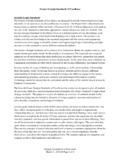Transcription of PHARMACIST EVALUATING EXAMINATION SYLLABUS
1 PHARMACIST EVALUATING EXAMINATION SYLLABUS The Pharmacy Examining Board of Canada 2019 Copyright 2019 by The Pharmacy Examining Board of Canada, all rights reserved. The information contained herein is provided solely for personal, non-commercial use. 2 Table of Contents INTRODUCTION .. 3 BIOMEDICAL SCIENCES .. 4 BIOCHEMISTRY .. 5 MOLECULAR BIOLOGY AND 6 PHYSIOLOGY/ FUNCTIONAL ANATOMY .. 7 IMMUNOLOGY .. 12 MEDICAL 13 PHARMACEUTICAL SCIENCES .. 16 PHARMACEUTICS AND DRUG DELIVERY SYSTEMS .. 17 PHARMACOKINETICS & BIOPHARMACEUTICS.
2 23 MEDICINAL CHEMISTRY .. 26 PHARMACOLOGY .. 28 TOXICOLOGY AND CLINICAL TOXICOLOGY .. 33 BIOTECHNOLOGY AND PHARMACOGENETICS .. 35 PHARMACY PRACTICE CLINICAL SCIENCES .. 40 PATHOPHYSIOLOGY .. 41 CLINICAL BIOCHEMISTRY / LABORATORY AND DIAGNOSTIC 45 PHARMACOTHERAPEUTICS .. 49 HEALTH PROMOTION AND DISEASE PREVENTION .. 54 PATIENT CARE PROCESS .. 55 SPECIAL POPULATIONS .. 56 NUTRITION .. 56 PHARMACY PRACTICE - PROFESSIONAL PRACTICE SKILLS . 57 PRESCRIPTION PROCESSING AND PRODUCT PREPARATION .. 58 PRESCRIPTION CALCULATIONS .. 59 COMMUNICATION / PATIENT COUNSELLING.
3 60 DRUG INFORMATION .. 61 LITERATURE EVALUATION / RESEARCH METHODS / EVIDENCE-BASED DECISION-MAKING .. 62 MEDICATION / PATIENT SAFETY PRACTICES .. 63 LAW / JURISPRUDENCE .. 64 PROFESSIONALISM/ ETHICS .. 65 COLLABORATIVE PATIENT CARE .. 66 BEHAVIOURAL, SOCIAL AND ADMINISTRATIVE PHARMACY SCIENCES .. 67 PHARMACY MANAGEMENT .. 68 CANADIAN HEALTH CARE SYSTEM .. 70 PHARMACOECONOMICS .. 73 BIOSTATISTICS .. 74 3 EVALUATING EXAMINATION SYLLABUS INTRODUCTION This SYLLABUS has been compiled to guide candidates who are preparing to write the PEBC PHARMACIST EVALUATING EXAMINATION .
4 It contains sample outlines of Canadian university level pharmacy course outline material, in subject areas that are considered important to the foundational knowledge base for preparation for the practice of pharmacy. It is emphasized that the material found within this SYLLABUS gives selected sampling from a variety of sources, and its purpose is to serve as a guide to the curriculum content of current pharmacy education in Canada. This information may be helpful in your preparation to write the PHARMACIST EVALUATING EXAMINATION .
5 However, this SYLLABUS should not be interpreted to be the blueprint for the construction of any questions for the PHARMACIST EVALUATING EXAMINATION . PEBC EXAMINATION questions are developed independently of this SYLLABUS . The SYLLABUS is organized into four sections that correspond to the four major subject areas represented on the PHARMACIST EVALUATING EXAMINATION . These include: Biomedical Sciences Pharmaceutical Sciences Pharmacy Practice Clinical Sciences Professional Practice Skills Behavioural, Social and Administrative Pharmacy Sciences Both formal education and practice experience prepare you for the PHARMACIST EVALUATING EXAMINATION , PHARMACIST Qualifying EXAMINATION and licensure as a PHARMACIST .
6 In order to determine what additional learning needs you have, prior to taking the EXAMINATION , you should assess the knowledge and skills that you have already acquired, in comparison with the subject areas evaluated in the PHARMACIST EVALUATING EXAMINATION . Remember that language proficiency will also affect your performance. Written and verbal language proficiency and communication skills, at a level satisfactory for a health professional, are essential for your preparedness for taking the PEBC examinations. Once you have identified your learning needs, it is your responsibility to find suitable reference sources, materials and/or additional experience to prepare for the PHARMACIST EVALUATING EXAMINATION .
7 A partial list of references and learning resources (review guides, textbooks, federal legislation and internet resources) is available on the PEBC website. 4 BIOMEDICAL SCIENCES Biochemistry Genomics and Molecular Biology Physiology/Functional Anatomy Immunology Medical Microbiology 5 BIOCHEMISTRY GENERAL DESCRIPTION The following topics should provide a fundamental understanding of biochemistry covering the topics of: intermediary metabolism of carbohydrates, lipids, proteins, nucleic acids and porphyrins; photosynthesis; the biochemical significance of hormones; and the molecular basis of information transfer for cell integrity and well-being.
8 TOPICS OF study : BIOCHEMISTRY Intermediary Metabolism Enzymes reaction rates and kinetics, the influence of xenobiotics, vitamins and trace elements Carbohydrates, structure and function, synthesis/degradation Glycolysis Citric acid cycle, glyoxylate cycle and pentose phosphate cycle Biosynthesis of lipids, regulation by insulin and glucagon, steroid hormones and atherosclerosis Oxidative degradation of amino acids Fatty acid oxidation, formation of ketone bodies ATP and bioenergetics including oxidative phosphorylation.
9 Electron transport and the effects of xenobiotics Macromolecules Nucleic acids Protein synthesis Chromosome structure, DNA replication and transcription, effects of antibiotics, cancer- causing viruses Lipids and membranes 6 MOLECULAR BIOLOGY AND GENOMICS GENERAL DESCRIPTION Molecular biology is an area of study that concerns the molecular basis of cell regulation, control of biochemical functions such as metabolism, secretion, gene expression, response mechanisms and other activities to preserve cell integrity and life.
10 Genomics encompasses recent advances in the field of molecular biology and the rapidly developing understanding of genetic information in life forms. study of genomics aims to understand the structure and functions of the human genome and focuses on identifying the mapping of genes and DNA sequences, and the molecular interplay of genes and their role in biochemical processes and disease. TOPICS OF study : MOLECULAR BIOLOGY AND GENOMICS Molecular Biology: Basis of Information Transfer for Cell Integrity and Well-being Structure and functions of proteins and lipids Biochemistry and cellular organization Essential amino acids, degradation of purines and uric acid production Cell signalling (neurotransmitters, hormones) cellular growth (the cell cycle)




